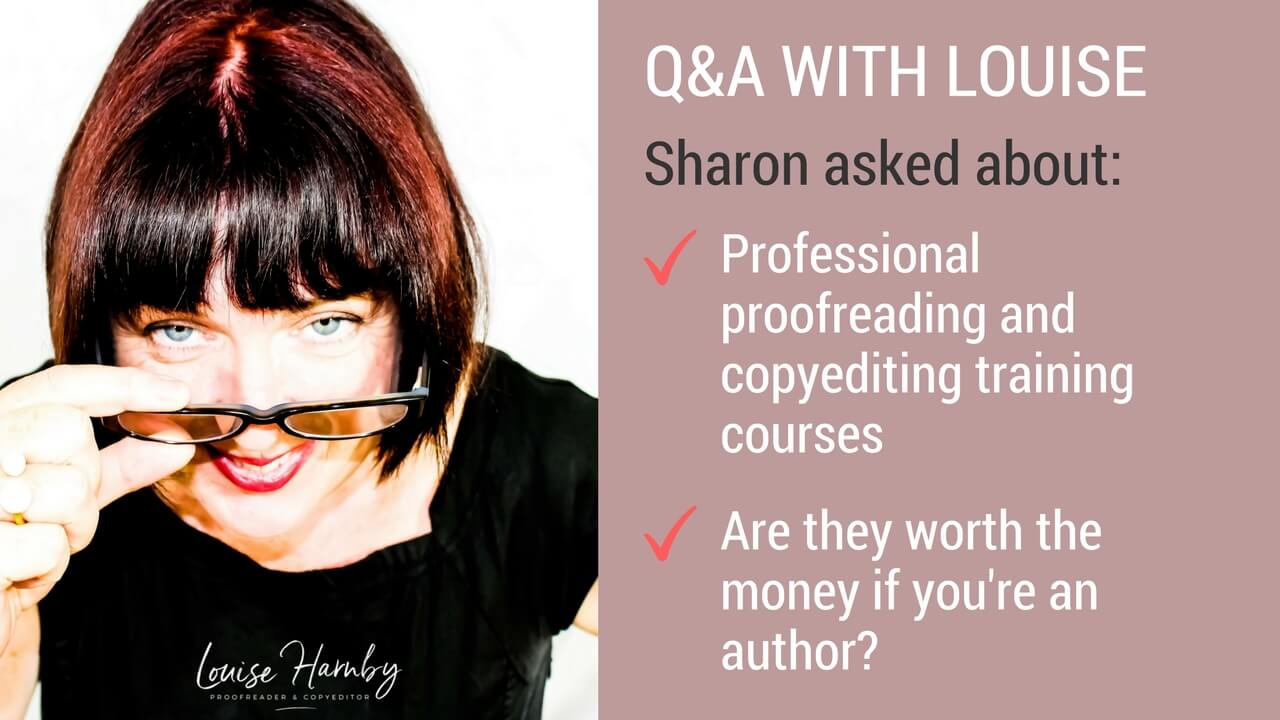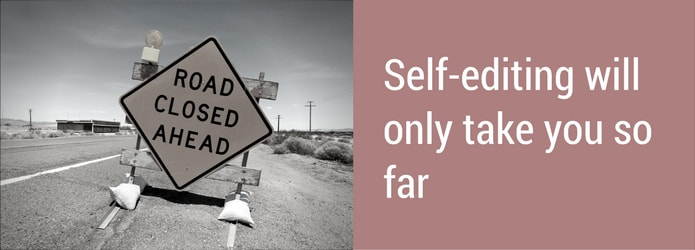|
Sharon is a self-published author who’s improving her self-editing skills with professional editorial training. However, she’s worried that her chosen course isn’t worth the money she’s paying.
Says Sharon:
Dear Louise, I am a self published author. I am trying to improve my skills on proof reading and copy editing. I am doing a course for [training provider redacted]. Can you give me any advice, are courses a waste of time and money. What do you advise me to do please help, many thanks Sharon
Hi, Sharon! Thanks for your question. I’m more than happy to guide you. My view is that there are several issues to consider:
After I’ve discussed these issues, I’ll offer you my recommendation on how best to proceed. Pro courses: what they do I believe that professional editors and proofreaders should undertake professional training to ensure that they’re fit for purpose ... just as an engineer, a plumber, a teacher or a doctor does. And while the course you mention isn’t one that I’ve done, the provider is recognized and respected by many UK editors and proofreaders and publishers. Let’s have a quick look at some of the key modules:
Here’s a brief summary of the differences between copyediting and proofreading as defined by the UK publishing industry. The two skills are different (though the terminology does tend to blur outside the mainstream). Says the Society for Editors and Proofreaders: Copy-editing is to ensure that whatever appears in public is accurate, easy to follow, fit for purpose and free of error, omission, inconsistency and repetition. This process picks up embarrassing mistakes, ambiguities and anomalies, alerts the client to possible legal problems and analyses the document structure for the typesetter/designer.
Assumed prior knowledge
The most important thing to recognize is that professional proofreading and editing training providers assume a level of proficiency in regard to the student’s existing sentence-level language skills. The courses are not designed to teach people standard spelling, grammar and punctuation (SPaG). Rather, they’re designed to help those who already have a solid grasp of SPaG to mark up, or directly amend, written materials in a manner that respects professional publishing conventions and the client’s brief and style. And while your course does include a module to help students assess whether their language skills are up to scratch, comprehensive grammar and punctuation training is not its focus. Your needs and the course’s intention: Is the fit good? There’s nothing wrong with your course’s syllabus. For someone who wishes to build an editorial business, and has an existing appreciation of conventional SPaG, the training is right on track. For that person, the course is not a waste of time or money. It’s a wise investment that will ensure they’re fit for purpose when they begin copyediting and proofreading for clients. However, I don’t think that course is the right fit for you. It’s teaching you skills that are not, for the most part, relevant to your immediate requirements. Instead, I think you should focus on strengthening your grammar and punctuation. See more below in ‘My recommendation’.
The limits of self-editing for pro self-publishers
A word of caution! I’m a professional copyeditor and proofreader. I blog regularly and know as well as anyone that self-editing has its limitations. Most of us, no matter how strong our language skills, cannot self-edit our own work as effectively as we’d edit another’s. That’s because we’re too close to our own writing; we see what we want to see on the page rather than what’s actually there. Carrying out several checks at intervals can help eradicate most errors but perfection is unlikely. It’s for that reason that I pay a colleague to proofread my blog posts before I publish them (with the exception of these Q&As, which I publish quickly because a reader’s asked for help and I don’t wish to keep them waiting). And even if my pro editor doesn’t find any literal errors, it’s unusual for them not to offer several improvements to the sentence flow for the purposes of clarity and engagement. And so once you’ve developed your SPaG skills, you’ll be able to remove many of the errors in your books, but not all of them. And it’s likely that a professional line or copyeditor will be able to help you smooth the text in a way that improves the flow of your narrative and dialogue. I realize that budget is an issue for some self-publishing authors. Nevertheless, I recommend commissioning professional editorial services if the author can afford it. Professional editors hire pros; so should pro authors if they want to mimic the standards that traditionally published authors strive for. Not doing so will mean that errors, inconsistencies and structural problems might still be evident to the paying reader. At the end of the post, I’ve included links to some resources that discuss the different levels of editing and the order of play, in case you (or other readers) need some additional guidance.
My recommendation
I commend you for seeking to develop your editing skills, Sharon. Self-editing is vital; the more you can do, the more money you’ll save when it comes to investing in professional editing! However, I think you’d be far better off investing in training that’s dedicated to teaching English-language grammar and punctuation standards. Start by searching online for grammar courses run by your local college or university. Before you enrol, speak to the course supervisor and explain what your problems are. That way you can ensure that the course is a good fit. Developing these skills will really help to drive your sentence-level editing forward. If your budget allows for it, consider seeking the assistance of a developmental or story editor before you start worrying about the detail. A manuscript evaluation or critique will help you deal with any big-picture issues before you spend time on the nitty-gritty. Sentence-level editing (by you or a pro) without prior structural assessment can be rather like trying to build a house on boggy ground – even if the walls look pretty at the outset, it won’t be long before cracks appear! Now it may be that you’re already attending to story craft. In which case, my apologies. Still, the advice will serve other indie authors who are wondering about the order of play. I hope my response helps you decide on where to go next. Thanks again for your question. Feel free to drop me a line in the comments if you want to follow up on anything I’ve mentioned. Resources
Louise Harnby is a fiction copyeditor and proofreader. She curates The Proofreader's Parlour and is the author of several books on business planning and marketing for editors and proofreaders.
Visit her business website at Louise Harnby | Proofreader & Copyeditor, say hello on Twitter at @LouiseHarnby, or connect via Facebook and LinkedIn. If you're an author, take a look at Louise’s Writing Library and access her latest self-publishing resources, all of which are free and available instantly.
0 Comments
Leave a Reply. |
BLOG ALERTSIf you'd like me to email you when a new blog post is available, sign up for blog alerts!
TESTIMONIALSDare Rogers'Louise uses her expertise to hone a story until it's razor sharp, while still allowing the author’s voice to remain dominant.'Jeff Carson'I wholeheartedly recommend her services ... Just don’t hire her when I need her.'J B Turner'Sincere thanks for a beautiful and elegant piece of work. First class.'Ayshe Gemedzhy'What makes her stand out and shine is her ability to immerse herself in your story.'Salt Publishing'A million thanks – your mark-up is perfect, as always.'CATEGORIES
All
ARCHIVES
July 2024
|
|
|
|



















 RSS Feed
RSS Feed





